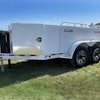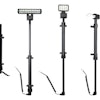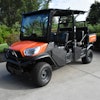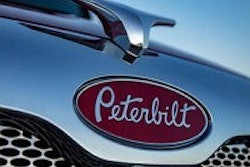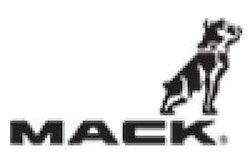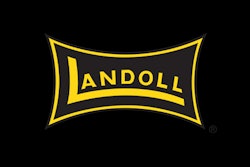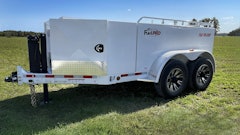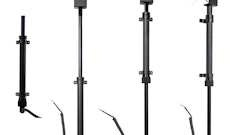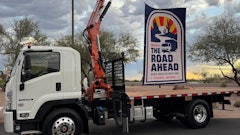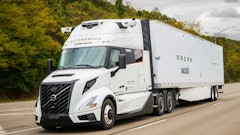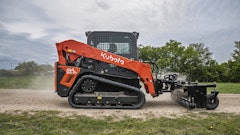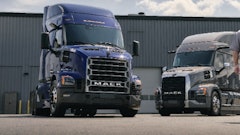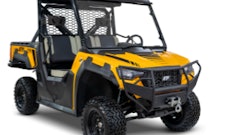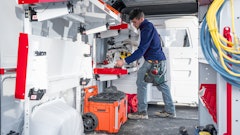Given the current economic climate and the ready supply of available trucks, you may see some contractors press vehicles into unintended applications, such as mating tractors with sleeper cabs to dump truck bodies or using them to pull dump trailers. But the basic fact remains - there is no substitute for using the right truck for the job.
Consider the case of a tractor pulling a bottom-dump trailer. In states that conform to the bridge formula, you are limited to 80,000 lbs. GVW. "You can fully reach the bridge formula with a bottom dump and a properly spec'd tractor," notes Jim Ladner, Landoll Corp. "A lot of these guys will go out and try to buy a road tractor to do bottom-dump work. You are hurting yourself by using the wrong truck. A day cab with the right wheelbase may actually weigh 3,000 to 5,000 lbs. less than that over-the-road truck."
That is 3,000 to 5,000 lbs. less legal payload that you can transport per trip. Multiply this times the number of trips per day, week and year and you can quickly pay for the right truck for the task.
Spec to reduce costs
The intended application is only one of many factors that can influence the overall operating costs of an individual truck.
As one of the largest general contractors in the state of Wisconsin, Miron Construction runs a fairly extensive fleet of heavy- and medium-duty trucks to support its varied construction operations. For semi tractors, the company exclusively runs Peterbilt Models 278 and 379. For medium-duty trucks, it uses Peterbilt, International and GMC trucks.
"The big issue in our industry is that trucking is a necessary evil," says Pete Klosterman. "Most of our semi tractors are standard over-the-road trucks pulling flatbeds and trailers. We don't do any heavy hauling. It is mostly hauling construction equipment - forklifts, generators, concrete forms, lumber and other typical construction freight. We do on the order of 100,000 miles a year per truck. They run on the road daily, sometimes six days a week in the summer."
The company buys all of its trucks new. "It is lower cost of operation," says Klosterman. "You have a warranty and the latest and greatest equipment for the drivers."
There are several criteria Miron Construction uses for selection. "The weight of the truck is always an issue, especially with fuel prices," says Klosterman. "Fuel mileage is definitely another large issue." For jobsites, turning radius is also a factor. "A lot of work is happening in urban areas these days, so turning radius and wheelbase are probably the ones that stand out the most."
The company also deliberately avoids carrying several different brands and models. "The commonality is certainly a big issue," says Klosterman. "The Peterbilt 278 and 379 are a very similar truck. The parts commonality is very good."
Limiting the variety of trucks helps make the company's internal maintenance shop more efficient. "We pretty much know the trucks inside and out and know the spare parts we need here," says Klosterman.
Match to your niche
In some cases, a truck's specs can actually create a point of difference from the competition. For example, Phoenix, AZ, abounds with Super 16 dump trucks due to local weight regulations. These 16-wheel standard dump trucks are equipped with pusher lift axles and a liftable tag axle that extends 11 to 13 ft. They allow the maximum effective payload for the Phoenix market.
Yet, Southwest Trucking & Grading has carved out a niche with standard 10-wheel Mack dump trucks. According to Brandon Rasmussen, general manager, there are certain jobsites where the maneuverability and lighter weight are an advantage. "It has been nice having 10-wheelers because a lot of people don't want Super 16s."
Such was the case on a job the company recently completed at the Phoenix Convention Center. "There were weight issues. They had ramps you had to get out on and they didn't allow as much weight," he explains.
Rasmussen also has experience with truck and pup setups. "They do work pretty well," he says, "But with the Phoenix Valley traffic, you just run more liability with the big trailers." The areas the company needs to maneuver in are also too tight for this type of setup.
Options for buying used
Previously owned trucks can offer value when used in the right applications, and chosen carefully.
"I think that customers who gravitate toward buying used are looking for value," says Drew Backeberg, manager of marketing and customer support, Daimler Remarketing. "They are looking for a lower monthly payment, understanding that a newer truck may have lower maintenance costs. Some percentage of customers naturally gravitates to used and some are going to gravitate to new."
A few truck manufacturers offer certified used trucks. Freightliner's SelecTrucks, for example, are suited for customers looking for highway trucks, including day cabs.
The trick to reliability with used trucks is to understand the vehicle's history and condition. This is where certified used trucks may have an advantage.
"We source the vast majority of our equipment from the largest fleets in the country," says Backeberg. "They are known for maintaining their trucks. Those vehicles, when we acquire them, are taken back in on trade. We inspect them when they are turned in from the fleet. Then we send them to our SelecTruck Centers and they inspect them again."
To be sold as SelecTrucks, vehicles must meet a certain standard of condition. "It is a mechanical and a cosmetic standard," says Backeberg. In some cases, thousands of dollars are spent bringing a truck up to standard.
The advantage is greater assurance of performance. "Literally all of our vehicles come with buyer's assurance," says Backeberg. "It is a 60-day coverage that covers all of the internally lubricated parts - the engine, transmission, rear axles - as well as integral components like turbochargers, injectors and EGR components. That 60-day buyer's assurance covers anything that is prone to fail."
A number of different warranty options may also be offered. "We will warranty a truck with a starting mileage of, say, 425,000 miles... with a three-year/300,000-mile coverage, which would theoretically carry it out to 725,000 miles," Backeberg cites as an example. "Our warranty does reduce the cost of ownership for our customers."

